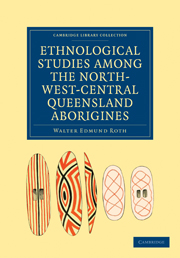Book contents
- Frontmatter
- PREFACE
- BIBLIOGRAPHY
- Contents
- ILLUSTRATIONS
- CHAPTER I THE SPOKEN LANGUAGE OF THE PITTA-PITTA ABORIGINALS: AN ELEMENTARY GRAMMAR
- CHAPTER II TABULAR COMPARISON BETWEEN VARIOUS SELECTED WORDS USED IN THE DIFFERENT ETHNOGRAPHICAL DISTRICTS OF NORTH-WEST-CENTRAL QUEENSLAND
- CHAPTER III SOCIAL AND INDIVIDUAL NOMENCLATURE: CLASS SYSTEMS, &c
- CHAPTER IV THE EXPRESSION OF IDEAS BY MANUAL SIGNS: A SIGN LANGUAGE
- CHAPTER V THE SEARCH FOR FOOD. PITURI
- CHAPTER VI DOMESTIC IMPLEMENTS AND UTENSILS. FIRE-STICKS AND YAM-STICKS. HUTS AND SHELTERS
- CHAPTER VII PERSONAL ORNAMENTATION AND DECORATION. MURAL PAINTING, &C.
- CHAPTER VIII RECREATION: CORROBBOREES, SPORTS, AND GAMES
- CHAPTER IX TRAVEL, TRADE, AND BARTER. THE SO-CALLED LETTER OR MESSAGE-STICK
- CHAPTER X THE MAINTENANCE OF LAW AND ORDER: FIGHTING, FIGHTING WEAPONS
- CHAPTER XI DISEASE, ACCIDENT, DEATH. CANNIBALISM
- CHAPTER XII RAIN-MAKING, THUNDER AND LIGHTNING-MAKING
- CHAPTER XIII ETHNO-PORNOGRAPHY
- INDEX AND GLOSSARY
- Plate section
CHAPTER II - TABULAR COMPARISON BETWEEN VARIOUS SELECTED WORDS USED IN THE DIFFERENT ETHNOGRAPHICAL DISTRICTS OF NORTH-WEST-CENTRAL QUEENSLAND
Published online by Cambridge University Press: 29 August 2010
- Frontmatter
- PREFACE
- BIBLIOGRAPHY
- Contents
- ILLUSTRATIONS
- CHAPTER I THE SPOKEN LANGUAGE OF THE PITTA-PITTA ABORIGINALS: AN ELEMENTARY GRAMMAR
- CHAPTER II TABULAR COMPARISON BETWEEN VARIOUS SELECTED WORDS USED IN THE DIFFERENT ETHNOGRAPHICAL DISTRICTS OF NORTH-WEST-CENTRAL QUEENSLAND
- CHAPTER III SOCIAL AND INDIVIDUAL NOMENCLATURE: CLASS SYSTEMS, &c
- CHAPTER IV THE EXPRESSION OF IDEAS BY MANUAL SIGNS: A SIGN LANGUAGE
- CHAPTER V THE SEARCH FOR FOOD. PITURI
- CHAPTER VI DOMESTIC IMPLEMENTS AND UTENSILS. FIRE-STICKS AND YAM-STICKS. HUTS AND SHELTERS
- CHAPTER VII PERSONAL ORNAMENTATION AND DECORATION. MURAL PAINTING, &C.
- CHAPTER VIII RECREATION: CORROBBOREES, SPORTS, AND GAMES
- CHAPTER IX TRAVEL, TRADE, AND BARTER. THE SO-CALLED LETTER OR MESSAGE-STICK
- CHAPTER X THE MAINTENANCE OF LAW AND ORDER: FIGHTING, FIGHTING WEAPONS
- CHAPTER XI DISEASE, ACCIDENT, DEATH. CANNIBALISM
- CHAPTER XII RAIN-MAKING, THUNDER AND LIGHTNING-MAKING
- CHAPTER XIII ETHNO-PORNOGRAPHY
- INDEX AND GLOSSARY
- Plate section
Summary
45. The Boulia District, the limits of which have already been defined in section 2, comprises in all a score or so of tribes, each having its head centre or chief encampment. Speaking generally, these same tribes are able to render themselves pretty mutually intelligible, and possess in common various traderoutes, markets, and hunting-grounds, customs, manners, and beliefs; in other words they might, as a whole, be well described as “messmates,” though in the aboriginal language there appears to be no one word which would express them collectively. Still deeper bonds of comradeship connect them in that all these tribes, within certain individual limitations to be subsequently discussed, are intermarriageable, and furthermore, in cases of warfare with outsiders, would join in making common cause against the enemy.
Owing to the opening up of the country with the advent of the Europeans, some of these tribal camps have been shifted of late years from their original quarters or else amalgamated with others, while in a few cases, what with privation, disease, alcohol, and lead, the whole community has been annihilated. Even during my sojourn at Boulia, the head-centre of the Pitta-Pitta tribe, I have never seen more than about 50 of these individuals congregated there on any one occasion, though this number might occasionally have been augmented by visitors coming in from neighbouring districts for purposes of trade and barter.
- Type
- Chapter
- Information
- Publisher: Cambridge University PressPrint publication year: 2010First published in: 1897



